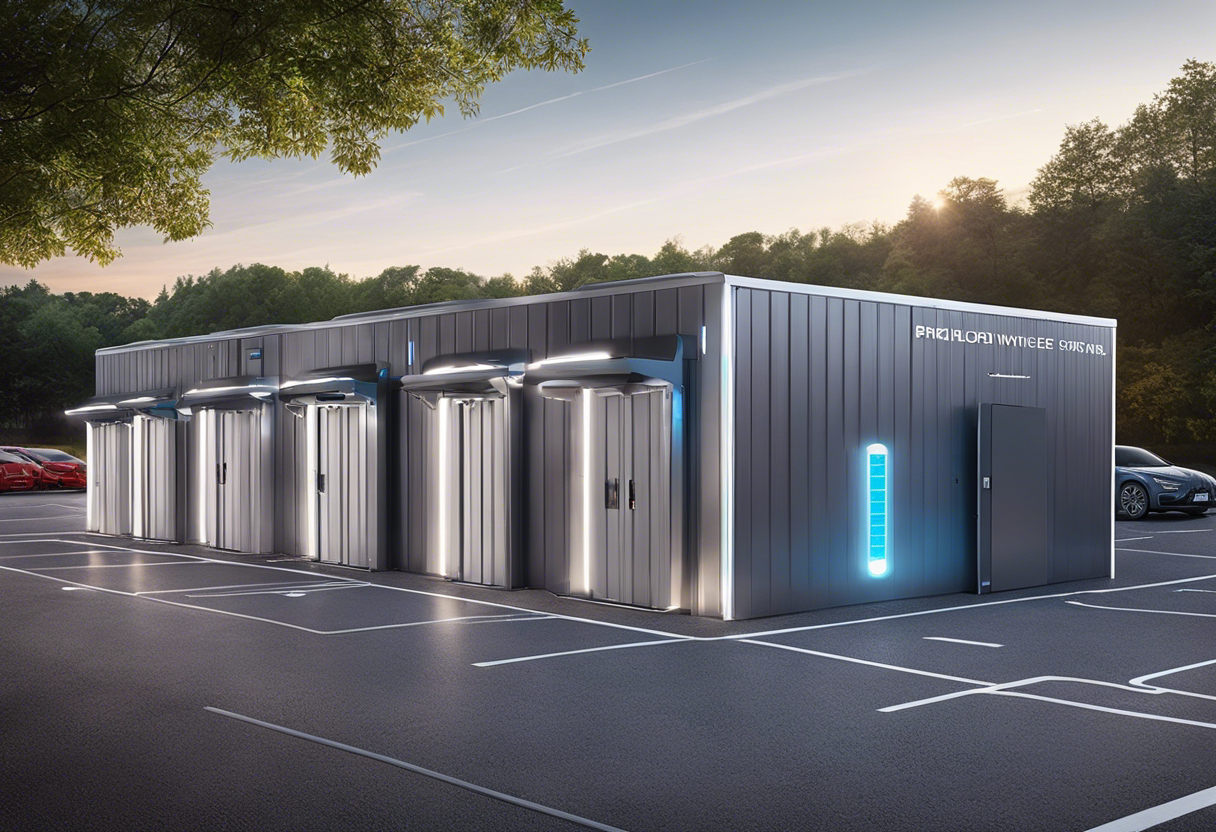When vehicle owners face extended periods away from their vehicles, auto storage emerges as a critical solution. This practice involves securing a car, motorcycle, or any other vehicle in a safe location while it’s not in use. The importance of such measures cannot be understated; auto storage shields vehicles from weather-related damage, theft, and vandalism. Moreover, it helps maintain the vehicle’s condition, preventing depreciation and costly repairs that can occur when cars are left unattended. Ensuring effective auto storage for long-term parking is thus not just a matter of convenience, but a vital aspect of vehicle preservation and value retention.
Understanding Different Types of Auto Storage Facilities
When selecting a long-term storage solution for a vehicle, understanding the variety of facilities available is crucial. Here are the common types:
- Outdoor Storage: Typically the most cost-effective option, offering basic protection from vandalism, but limited shelter from weather-related wear.
- Covered Outdoor Storage: Provides some protection against sun and precipitation, suitable for areas with mild weather conditions.
- Indoor Storage Units: These are garage-like spaces that offer maximum protection from the elements and added security; ideal for high-value vehicles.
- Climate-Controlled Storage: A premium choice for safeguarding vehicles against temperature fluctuations and humidity, preserving the vehicle’s condition.
- Stackable Storage Facilities: A space-efficient option often found in urban areas, providing protection similar to indoor units but with a reduced footprint.
The Significance of Location and Accessibility
Choosing the right location for long-term vehicle storage is crucial. It determines ease of access and plays a vital role in the level of convenience offered to vehicle owners. A secure and easily accessible storage facility means:
- Less travel time and cost when visiting the vehicle
- Enhanced security features due to strategic placement
- Proximity to maintenance services for periodic vehicle check-ups
- Availability of transportation links for owners upon vehicle drop-off and pick-up
Therefore, location and accessibility should be top considerations to ensure the vehicle’s safety and the owner’s peace of mind during extended parking periods.
Security Features to Look for in an Auto Storage Facility
When evaluating an auto storage facility for long-term parking, prioritize these crucial security features:
-
24/7 Surveillance: Constant monitoring via CCTV cameras acts as a deterrent against theft and vandalism.
-
Controlled Access: Facilities should only be accessible through secured gates or doors, often utilizing personalized keycard or code entry systems.
-
Lighting: Well-lit areas minimize hiding spots for potential intruders and improve camera footage quality at night.
-
On-Site Staff: The presence of security personnel or regular staff patrols can swiftly address security breaches.
-
Alarm Systems: Alarms on entrances and individual storage units provide immediate alerts of unauthorized access.
-
Fencing: Robust, high-perimeter fencing can effectively hinder unwarranted entry into the property.
Ensuring these features are in place can give vehicle owners peace of mind when entrusting their cars to a storage facility.
Climate-Controlled Storage:
Determining the necessity of climate-controlled storage for your vehicle involves assessing several factors. Firstly, consider the climate in your region. Extreme temperatures can wreak havoc on a vehicle’s systems, causing fluids to degrade or rubber components to crack. Humidity is another culprit, potentially leading to corrosion and mold growth. Collectible cars or those with sensitive electronics benefit greatly from regulated environments. Climate-controlled storage may be a prudent investment for ensuring the longevity and maintaining the value of such vehicles. Assess individual needs against potential risks to make an informed decision.
Auto Storage Costs:
When considering auto storage, the cost can vary widely based on location, amenities, and the length of time you plan to store your vehicle. Expect monthly fees:
- Indoor storage: $100-$450
- Outdoor storage: $30-$100
- Climate-controlled units: Additional $25-$75
To secure the best deal:
-
Compare prices from multiple facilities.
-
Inquire about discounts, such as for long-term contracts or prepayment.
-
Evaluate the necessity of premium services like climate control.
-
Review insurance coverage; some facilities offer inclusive insurance, which can affect overall value.
-
Inspect security features, as a well-protected facility may mitigate insurance costs.
Negotiate terms and remain flexible with your storage dates for the possibility of reduced rates.
Evaluating the Size and Space Requirements for Your Vehicle
Before selecting a long-term parking solution, one must assess the size and space required to store their vehicle adequately. Essential factors to consider include:
- The vehicle’s dimensions: height, width, and length to ensure the chosen storage space can accommodate the vehicle comfortably.
- Additional space for opening doors and accessing the car without causing damage.
- Clearance for both the vehicle and foot traffic around it within the storage facility.
- The potential need for extra room if the owner plans to conduct maintenance or inspections periodically.
- The facility’s ability to accommodate unique vehicle requirements, such as electrical hook-ups for electric vehicles.
Accurately determining these elements will lead to a more protective and accessible storage environment for the vehicle.
Insurance and Liability Considerations for Stored Vehicles
When storing a vehicle for an extended period, it’s imperative to review and perhaps modify your insurance policy accordingly. Vehicles in storage might not require the same level of coverage as those in regular use, but comprehensive insurance can protect against theft and damage from non-collision related incidents, such as fire or severe weather.
- Maintain a Basic Level of Insurance: Even when not in use, keeping at least comprehensive coverage is advisable to protect against unforeseen damages.
- Inform Your Insurance Provider: Notify your insurer of your vehicle’s change in status to ensure appropriate adjustments can be made.
- Documentation and Records: Keep a record of the storage location, period, and any agreements or contracts in case they need to be presented to the insurance company.
- Consider Additional Liability Coverage: If others have access to your stored vehicle or if there’s a risk of damage to the storage facility, additional liability coverage may be warranted.
By addressing these considerations, vehicle owners ensure that their stored auto remains safeguarded against potential risks.
Amenities and Additional Services Offered by Auto Storage Facilities
Auto storage facilities often extend beyond simple vehicle parking to include various amenities and services aimed at vehicle preservation and customer convenience. Common offerings might encompass:
-
Climate-controlled units for protecting vehicles against extreme temperatures and humidity.
-
Battery maintenance services to ensure your vehicle starts upon your return.
-
Tire inflation and rotation to prevent flat spots and maintain tire health.
-
Dust covers or car capsules that guard against dirt and scratches.
-
Transport services for the easy drop-off and retrieval of your vehicle.
-
24/7 security and surveillance for peace of mind.
-
Online reservation and payment systems to streamline the rental process.
-
Car wash and detailing services for a clean vehicle on collection.
Each facility may differ in offerings, so it’s essential to inquire about specific amenities to meet your auto storage needs.
Reading Reviews and Gathering Recommendations
When contemplating long-term auto storage solutions, soliciting advice from those with experience becomes invaluable. Vehicle owners should:
- peruse online reviews of storage facilities, focusing on security, customer service, and vehicular care
- ask family, friends, and colleagues for trusted storage recommendations
- consider feedback from automotive forums and social media groups specializing in car storage and maintenance
- weigh all information carefully, acknowledging that personal anecdotes may not guarantee universal experiences
This collected insight guides decision-making, ensuring one’s vehicle is left in reputable hands.
The Contract and Agreement:
Key Points to Review Before Signing
When planning to store a vehicle long-term, meticulously reviewing the storage facility’s contract and agreement is imperative. Key factors to consider include:
-
Duration of Storage: Ensure the contract clearly states the start and end dates for storage.
-
Payment Terms: Review the payment schedules, amounts, and applicable late fees.
-
Liability Coverage: Check what damages are covered and the extent of the facility’s liability for your vehicle during storage.
-
Access Rights: Confirm how often and under what conditions you can access your vehicle.
-
Termination Clause: Understand the process for early termination, including notice periods and penalties.
-
Maintenance Agreements: If offered, review any additional agreements regarding vehicle maintenance during the storage term.
Thoroughly understanding these aspects helps secure your vehicle’s safety and avoid unforeseen complications.
Tips for Preparing Your Vehicle for Storage
When storing a vehicle for extended periods, proper preparation is crucial to ensure its condition remains pristine upon return. Here are several steps to follow:
-
Clean Thoroughly: Wash the exterior to prevent rust, and clean the interior to avoid mold and odors.
-
Top Off Fluids: Change the oil, top off the gas tank, and add a fuel stabilizer to prevent corrosion.
-
Maintain the Battery: Disconnect the battery or use a trickle charger to preserve its life.
-
Prevent Tire Flat Spots: Inflate tires to the recommended pressure or use tire stands to alleviate weight.
-
Rodent-Proof: Block any openings to keep critters from nesting inside.
-
Invest in a Car Cover: Select a breathable cover to protect from dust and scratches.
These measures will safeguard the vehicle and simplify its reawakening when the time comes to take it back on the road.
Conclusion:
When selecting the best auto storage solution, vehicle owners must consider several pivotal aspects. Evaluate the duration of storage, climate, security measures, accessibility, and cost involved. These factors influence the suitability of indoor versus outdoor options, climate-controlled units, and additional services like maintenance. An informed decision will safeguard your vehicle’s condition, ensure security, and offer peace of mind during long-term parking. Prioritize your specific requirements and the well-being of your automobile to select the most appropriate and reliable storage facility.
FAQS About Auto Storage
learn more: Finding the Right Policy for Every Driver
learn more: Ensuring effective auto storage for long-term parking

